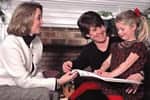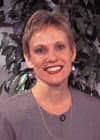A North Carolina-based facility is dedicated to helping parents make educational decisions concerning their deaf and hearing-impaired children.

Beverly Elwell is hearing impaired. She was discovered to have congenital hearing loss when she was 3 years old. Her parents, both educators, made sure that she, their oldest child, had the right amplification and was given the ability to succeed. But, for many parents, the discovery of their child’s hearing loss is a burden that leaves them asking questions and searching for answers. However, in North Carolina, Elwell and the people at Beginnings for Parents of Children Who Are Deaf or Hard of Hearing Inc provide a free service that helps parents make the right decision for their children.
Elwell, a parent educator at Beginnings, says that her parents reacted to the news that she was hearing-impaired much like the parents she sees every day.
“My parents did not react well, at first, as I was their firstborn child and they felt that I was intelligent,” she says. “And they did not want to believe that anything was ‘wrong’ with me.
“My parents decided early on that I was going to be their daughter who happened to have a hearing loss. They constantly encouraged me to do what my friends were doing and to believe that I could do anything I wanted to do.”
In her job as a parent educator at Beginnings, she tries to help give parents all the information they need when dealing with a child who is deaf or hard of hearing. The goal is to help those parents make decisions on technology and treatment early and until that child is 21 years of age. Services are also provided for deaf parents of hearing children.
“My first goal is to build rapport with the family so they will trust me and want to learn from me,” she said. “I tell parents that I believe they know their child better than I or any professional can or could ever know [them].”
“My goal is to give them support and accurate and objective information about hearing, hearing loss, its effect on the acquisition of language and speech, the different communication methodologies, the different educational placement options, and related service needs.”

An Intermediary for Parents
Beginnings acts as an intermediary for parents who have recently discovered that their child has a hearing problem. Its staff work with parents, medical professionals, and educators to assure that the parents understand the child’s degree of hearing loss and what steps need to be taken to assure that their child has every chance to succeed. Hearing loss varies from person to person and ranges from slight to profound. Decisions include what kind of hearing aid a child might need, if any—high frequency aid, programmable hearing aid, behind the ear FM auditory trainer, or modified earmolds—and whether a cochlear implant, which is implanted into a person’s hearing system, may be correct for the child. They also have to make decisions about what types of communication a child will learn, keeping in mind that not all children respond to all types of communications. They work with parents to decide what type of education is best for their child. They also work with educators to help them understand the child’s needs and to make sure that they are being met.
Elwell has worked at Beginnings as a parent educator for 4 years and her and her colleagues’ belief that parents are the ones who are better qualified to make decisions about their child’s hearing loss allows them to be an impartial party in those decisions. Beginnings has two offices in North Carolina, one in Charlotte that serves the counties in the western half of the state and one in Raleigh that serves the counties in the eastern half of the state. Joni Alberg, PhD, is the executive director of the program.
“Beginnings was formed in the mid 1980s when a group of parents whose children were deaf and hard of hearing gathered to express their frustration with the lack of information about educational and communication options provided to them,” she said. “At that time, the primary placement for children who were deaf or hard of hearing was in residential state-operated ‘schools for the deaf.’”
The primary method of communication at the three North Carolina Schools for the Deaf was sign based. Additionally, most of the time parents were not included in the decision-making about their children’s placement.
The “professionals” told them what was best for their children. Beginnings, she says, was established as a resource for parents to learn about alternative placement and communication options that were being used with children having a hearing loss. The Beginnings philosophy of parents being the primary decision-makers has been in place from the start.

Becoming a Nonprofit Organization
Alberg says that when it started, Beginnings was just one person in one office that was part of a larger state program. In a short time, Beginnings became its own nonprofit and established an office in the middle of the state. With a small budget, the organizational focus was to let people know that they were there. That is when the state decided to increase the size of the project, but that decision caused objectivity problems.
“By the mid 1990s, the state of North Carolina (specifically the Department of Health and Human Services, Division of Services for the Deaf and Hard of Hearing) decided that the services Beginnings was offering could be provided on a larger scale if Beginnings was housed within the division,” says Alberg. “A budget of about $1 million was provided and Beginnings was no longer an independent nonprofit. In fact, the division changed the name to Family Resource Centers and housed three centers, each within a state School for the Deaf.
“This arrangement did not work well at all for several reasons. One of Beginnings’ strengths was its ability to be impartial and objective, providing information about all education and communication options. As part of a state agency, it was very difficult to provide unbiased information to parents. And Beginnings’ initial mission and autonomy were compromised. The foundation for all that we do is the belief that given accurate, objective information about hearing loss, parents can make sound decisions for their child.”
After a year, the former board of directors lobbied the state to allow Beginnings to try to provide the same services as a nonprofit again, because they believed that Beginnings could provide such services cheaper and better. The organization, now under the Department of Education, was provided with a $500,000 contract. The new goal, says Alberg, is to make Beginnings less dependent on state funds.
“When I came as executive director in August 1999, Beginnings operated with this one contract,” she says. “The amount of money provided through the contract was increased for fiscal year 2001, after a lobbying effort demonstrating growth in services and demand. During the current legislative session, major cuts were made to all programs and our budget was slashed 28%.
“Fortunately, we have been branching out to establish other funding sources and this effort will continue to be a major focus for me this year. We have participated in fund-raising activities, written (and received) grants, obtained a contract from another state agency, and reorganized. This latter effort was most challenging as our staff is small.”
Beginnings works with families from the day that they realize their child has hearing loss to help them understand the type of loss that a child might have and what communications methods are available.
An Individualized Family Service Plan
It provides for each family an Individualized Family Service Plan (IFSP). This is a written plan for the Infant-Toddler Program services. It is a blueprint of how the family and a team of experts will work together to provide the services the parents choose for their child. The family-centered plan puts the parents in an active decision-making role. The key to making good decisions, says Alberg, is early detection.
“A child whose hearing loss is detected in the first months of life and who receives early intervention may be on the same language and learning levels as his or her hearing peers,” she says. “A child whose hearing loss is not detected until the age of 2 or 3 years (or older) may not be on the same developmental level as his or her peers.”
Almost one in every 1,000 children is born deaf and six in every 1,000 have some form of hearing loss at birth. That means that 24,000 infants in the United States are affected with some form of hearing loss at birth per year. The National Institutes of Health recently suggested that all infants be screened at birth and, because hearing loss occurs at a rate of 20% to 30% in early childhood, that children should be screened throughout their early years.
The two most frequently used methods to test infants are the Auditory Brainstem Response (ABR) and Otoacoustic Emissions (OAE). Infants can be tested while they are sleeping and no response is required of the child.
Professional Referrals
Beginnings receives referrals from professionals, primarily audiologists, about children who have hearing loss. Parent educator Cynthia Ausley says that the first step is to try to set up a home visit to share information.
Ausley says that there are many questions to be answered before the first contact is even made. Those include answering queries on the family’s acceptance of the child’s hearing loss.
“By contacting the source first, the parent educator is able to confirm the hearing loss and find out the best way to approach the family,” she says. “Is the family accepting the hearing loss or is it in denial? Are hearing aids recommended; if so, where is the family in the process of obtaining them?”
Ausley says that the difficult part of her job is telling parents that their child’s sensorineural hearing loss is permanent. “Hearing aids are assistive listening devices that may be recommended but will not ‘cure’ the hearing loss, only amplify sound.
“We suggest a home visit so that this information can be shared in the family-centered environment, and at their convenience,” she says. “Our initial goal is to listen to the parents, assess what level of acceptance they are at, helping them move toward acceptance, and then stress the importance of moving quickly toward appropriate amplification and early intervention.
“Communication is a key to success and with communication comes language development. Within the variety of school settings, I have observed different communication options work for different families. There are a variety of communication options, and we believe parents must be the ones to decide which option is best for their child and family.”
Communication options for the hearing-impaired range from American Sign Language in which English is taught as a second language (ESL), to Oral in which a child is taught to use their residual hearing with the help of a hearing aid and speech reading. The use of sign language is not encouraged in this form of communication. Cued uses eight different hand-shaped cues to represent speech to make language clear through vision. The last type is total, in which the child is exposed to all forms of communication to see which they adapt to better.
Ausley says that parent misconceptions are varied, ranging from some parents who believe that cochlear implants, which are a hot topic, is the answer to people who are unaware of their communication options.
“I have met parents, professionals, and members of the general public who believe because a child does not have speech or is unable to read lips, they have a lower IQ,” she says. “Frequently, many believe because I can sign I know Braille!”
Michelle Miller, an audiologist in Raleigh, says that Beginnings has helped her office in many ways.
“When we first diagnose a child with hearing loss, we make a referral to Beginnings and they promptly contact us for more information and subsequently contact the family,” she says. “They are willing to help families in any way needed including counseling and advocacy on behalf of the child.
“In addition, they have a Spanish-speaking staff member who has personally assisted me with several difficult cases. I know that I can count on Beginnings to take the time to counsel parents extensively, well past what I can do in the office at the time of diagnosis.”
Unbiased Help
Elwell believes that she is fortunate that early group of parents felt the need for unbiased help in making decisions about their children’s futures.
“Through the guidance of three superb executive directors, over a period of 14 years, Beginnings has grown to be a highly respected organization that collaborates well with other agencies and service providers,” she says. “I feel fortunate to be a part of this organization. I have had the opportunity of working both in educational settings (residential, public schools, and a community college) and in the business arena (public accounting office and not-for-profit accounting), yet this job has by far been the most rewarding for me.
“I gauge personal success in my work by statistics showing the number of families served over a period of time and knowing that the support and information shared with families have made a difference, and by families calling back at later periods in their child’s life asking for more information, and the support and the camaraderie of the parent educators in working toward a common goal.”
Bruce G. Bean is a contributing writer for Hearing Products Report.





